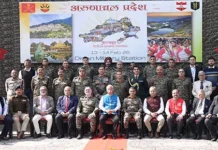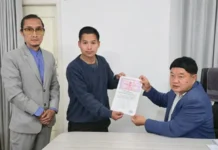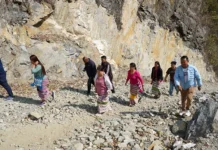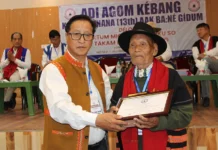[ Utpal Boruah ]
ITANAGAR, 7 Apr: Even after the passage of the Constitution (128th Amendment) Bill, aimed at bolstering women’s participation in electoral politics, the ground reality speaks of a different narrative in Arunachal Pradesh.
Only a few women are taking part in the simultaneous polls to the two Lok Sabha seats and the 50 assembly constituencies to be held in the state on 19 April.
Toko Sheetal, a greenhorn representing the Gana Suraksha Party, is the only woman among the total 14 contestants for the two Lok Sabha seats – Arunachal East and Arunachal West.
Only eight women filed nominations for 50 assembly seats. The ruling BJP has fielded four, the opposition Congress has nominated three, while there is one independent candidate. Only one woman represented the state in the Rajya Sabha to date, while 15 women were elected to the assembly since Arunachal graduated to a full-fledged state in 1987 from the North East Frontier Agency. Of the eight, BJP nominee from Hayuliang constituency, Dasanglu Pul, won uncontested.
According to women activists and political analysts, several factors, such as cultural barriers, socioeconomic constraints and lack of awareness could contribute to the low participation of females in electoral politics.
Arunachal Pradesh State Commission for Women Chairperson Kenjum Pakam said, “Women should be given a chance to have the right to vote and be voted for. This will allow them to occupy political offices and contribute to the development of the nation.”
Expressing dismay at the low participation of women in electoral politics, she said that addressing these issues requires concerted efforts from both the government and civil society organisations to create an enabling environment that promotes women’s involvement in the political process.
“Investing in women leadership is investing in a stronger, more vibrant nation,” the APSCW chief asserted.
Arunachal Pradesh Women’s Welfare Society president Kani Nada Maling urged voters to elect leaders committed to women’s empowerment.
Maling said that she is of the view that in Arunachal women are not allowed to make decisions and, as a result, many competent leaders are not able to participate in politics.
“Without women’s representation in the assembly, how can their grievances be redressed? How can they be empowered? Bold and vocal women leaders should be elected to the assembly, not those who usually act as a rubber stamp (of men),” she said, adding that steps are required to make more women come forward and join politics.
“Awareness campaigns, training and mentorship programmes for aspiring female politicians, equitable access to resources and opportunities, and implementing policies that support work-life balance for women in politics could help improve the situation,” Maling said.
Rajiv Gandhi University Political Science Associate Professor Dr Nani Bath advocated quick implementation of the law on reservations for women in politics.
“Education and literacy have failed to erase the patriarchal mentality ingrained in our society and culture, which is the prime factor for such a scenario,” Bath added.
The Women’s Reservation Act mandates reservation of one-third of the total number of seats in the Lok Sabha, and state legislative assemblies for women will come into effect later. The seats would be reserved for female candidates following the census and delimitation exercises.
Sibo Kai was nominated by the governor to the assembly in 1978. Nyari Welly was the first woman to get elected to the assembly in 1980 from Seppa assembly constituency as a People’s Party of Arunachal nominee. Komoli Mosang was elected as an independent candidate in 1980 from Nampong constituency. Mosang was reelected from the seat in 1990 as a Congress nominee.
Omem Moyong Deori was elected uncontested to the Rajya Sabha in 1984. She also won from the Lekang assembly seat in 1990 on a Congress ticket. (PTI)




